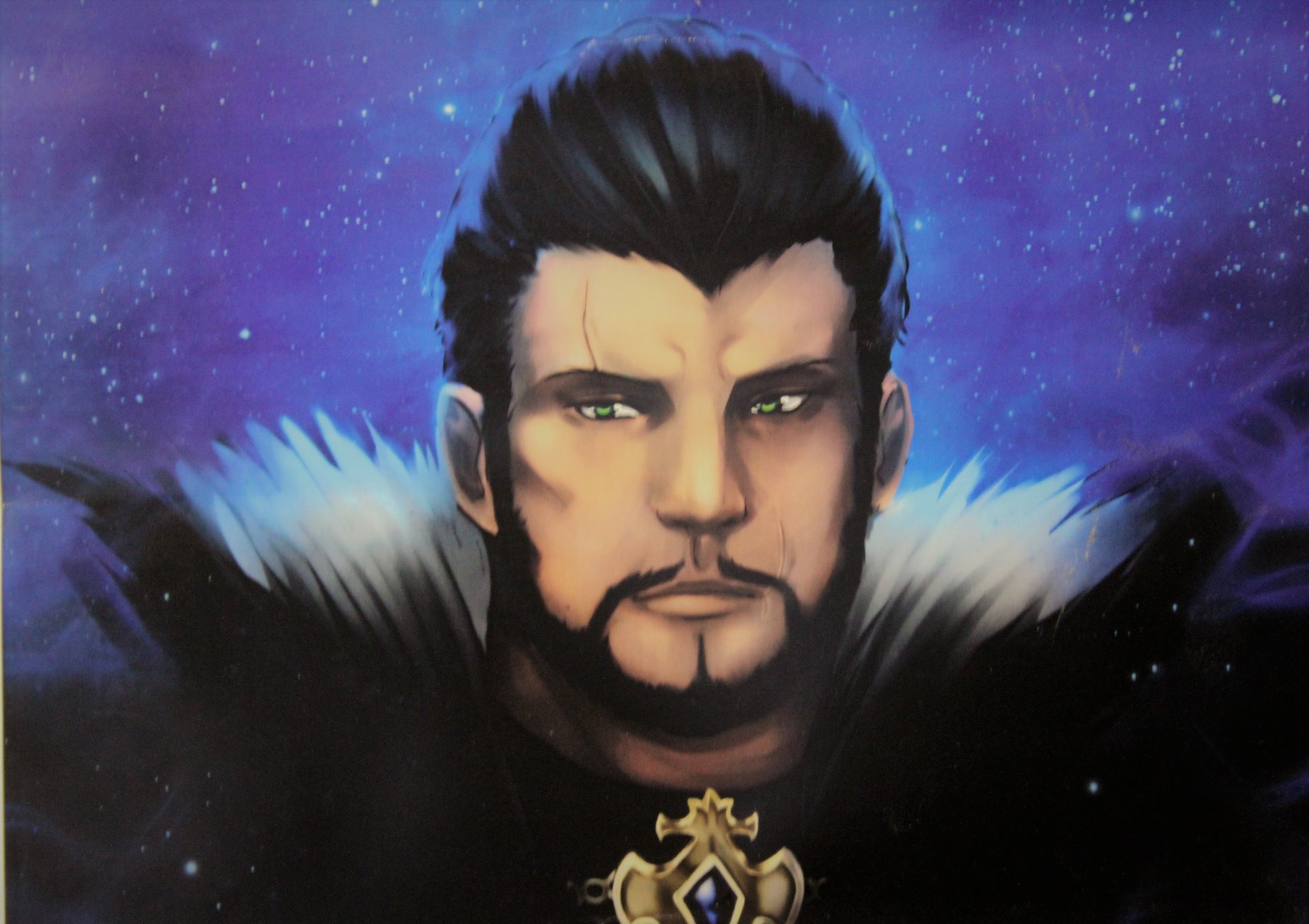I... get the impression you read my first paragraph, and ignored the rest. Yes, I acknowledged later on that this is not how it works, and in the final paragraph acknolwedged this is not how it works even in the Alexander raid.
And while you said you'd said your last on the matter, there was one thing you mentioned that I had to address:
No, Mide's treatment is NO DIFFERENT than the WoL's with the exception that, in the end, she is transported to the past and lives out her life there. Her life follows a single timeline. She' is born, she grows up, she has time travel shenanigans with Alexander, she travels to the past, grows old, and dies. The WoL is born, grows up, has time travel shenanigans with Alexander, then in the future presumably grows old and dies, though that future is not yet written.
Mide does not go through the loop over and over. She goes through it once. An observer outside of time watching her would not see her go around the loop over and over. If they were to follow her life, they'd see her loop one time, and that's all. Just like someone watching a roller coaster will see the car go through the loop one time.
This is true for all of the actors in this scenario. Discworld has an example of the "endless loop" that you postulate in the book "Pyramids":
In that book Dios, the high priest of the Egypt-analogue kingdom, has been high priest for as long as he or anyone else can remember. At the end of the book he's sent back in time, where he helps to found the kingdom and immediately becomes its high priest. He was never born, never dies, and has always been and always will be an old man acting as high priest over and over for the first eight hundred years of his kingdom's history. From his personal perspective it would be an endless eternity - or would, if, as a mercy, his limited memory prevented him from realizing his fate.
THIS would be a case where an observer outside of time could truly say the cart is going around the loop endlessly. Mide's case is different. Only a segment of her life is spent in the loop, goes through it once, and that's it. A segment of her life exists before the loop, and after - it just happens that the segment that occurs after takes place chronologically in the past. To her, though, and to an outside observer watching her life from start to finish, though, it's a single, unbroken path.
BOTH of these examples are Bootstrap Paradoxes, in that actors in the loop take actions that lead to them going to the past and setting things up so that they will take those actions, but you can hopefully see how they're different: in one the actor has no existence outside of the loop and rides around it over and over, in the other the actor has an existence before entering the loop, and an existence after leaving it.
-
09-30-2020 09:59 PM #251Player

- Join Date
- Dec 2013
- Posts
- 3,822
- Character
- Lineage Razor
- World
- Gilgamesh
- Main Class
- Goldsmith Lv 90
(1)
-
10-01-2020 08:35 AM #252This isn't exactly what happens. At the end of the Alex raid series, Mide and Dayan are sealed within Alexander's stasis bubble, before it's revealed that in the ancient past two Au Ra children emerged from Alexander bearing the Enigma Codex to found the tribe that Mide and Dayan originally came from. Meaning, Mide and Dayan, or at least their genetic material and the Enigma Codex, are indeed part of a neverending timeloop.No, Mide's treatment is NO DIFFERENT than the WoL's with the exception that, in the end, she is transported to the past and lives out her life there. Her life follows a single timeline. She' is born, she grows up, she has time travel shenanigans with Alexander, she travels to the past, grows old, and dies. The WoL is born, grows up, has time travel shenanigans with Alexander, then in the future presumably grows old and dies, though that future is not yet written.
Mide does not go through the loop over and over. She goes through it once. An observer outside of time watching her would not see her go around the loop over and over. If they were to follow her life, they'd see her loop one time, and that's all. Just like someone watching a roller coaster will see the car go through the loop one time.(4)
-
10-02-2020 02:09 AM #253Player

- Join Date
- Nov 2017
- Posts
- 14,070
- Character
- Aurelie Moonsong
- World
- Bismarck
- Main Class
- Summoner Lv 90
Even if that has a bearing on how time works in that particular instance, we still have the other time-travel event which happens in "real time" and - as I think on it now - is every bit as reliant on time travel not automatically creating a split timeline.
If our trip to three years ago only has us affecting a copied timeline and not the original, there is no possible way for Quickthinx be in possession of of Backrix's journal-from-the-future in the original timeline.
Therefore, as far as I can see it, if the rules of time travel are constant between the two stories (and I certainly hope that they are) then I think it is impossible for G'raha to have created a second timeline simply by arriving in Lakeland. Something had to happen after that point to cause the divergence, and I think it can't happen until he is interacting with history as he knows it, which only occurs once he is interfering with events in the Source.
To use the "three years ago" incident as an explanation point, my thinking is that time would only split if we did something that young Mide saw and couldn't possibly forget or misremember - but also something that present-day Mide knows didn't happen to her, and (unlike the reveal that the goblins were responsible for her friends' deaths) isn't just a reframing of the existing facts.
So if we'd acted to protect or heal her friends who got shot, that would be a change that made events play out differently to how present Mide remembers them because she saw her friends die.
On the other hand, if we were somehow able to rescue Dayan after young Mide lost sight of him but before he was actually pulled into the core, that would not have split the timeline. It would just mean that events turned out differently in that single version of the story and the one we saw never existed, because it doesn't have to.
If anything, I'd speculate it's the fact that G'raha comes from that other timeline that prevents it from being shut down as a once-possible future that didn't happen.
It was kind of funny the first time but calling him that every time just makes your argument harder for me to process.
I'm not understanding your point here. If Alexander got brought out of stasis in either timeline and travelled back to drop off Mide and Dayan in the far past, it would end up at a point before the timelines ever split in the first place.
Even if the timelines split apart as soon as G'raha arrived in the past, by Source time the absolute earliest point it happened was in 3.4 after Minfilia departed to the First. Alexander is going to have to go back a lot further than that.
You could handwave the genetic material thing as that somehow by random chance, their descendents managed to acquire the exact same configuration of genes... assuming that's even in play in this world and it's not some kind of weird aetherial equivalent.
As for the codex itself, I understood it that the concept of what was recorded in the codex might be cycling through the time loop, where ancestor-Mide creates the codex based on her past reading of it, but I don't think the physical object is the same one going around and around.(1)
-
10-02-2020 05:15 PM #254
I thought it was heavily implied to literally be the two of them that step out in the past, just deaged somehow.
Also, it could be the discrepancies between the two time situations we have here simply has to do with the nature of who was doing it and what it entailed. Alex basically calculated the perfect set of events to create a timeline that he would not actually directly affect. If there was ever a "split" it would have occured when he first established the events of that timeline, not when he was reemacting it.
Meanwhile, G'raha time travels as a last-ditch hail mary, interdimensionally, with Omega's tech added in, with active disregard for the ramifications.(1)
-
10-02-2020 05:26 PM #255Player

- Join Date
- Nov 2017
- Posts
- 14,070
- Character
- Aurelie Moonsong
- World
- Bismarck
- Main Class
- Summoner Lv 90
Yeah, it's them - the question is what happens next. It's "Mide's ancestor" who created the codex a hundred years ago, not 26-year-old Mide as we know her. She is still born, lives and dies, except that from an external view of the timeline, the second half of her life happens earlier in time than her birth.
Present-day Mide is carrying on her family's legacy, unaware that her elderly relative is/was an older version of herself.(0)Last edited by Iscah; 10-02-2020 at 05:29 PM.
-
10-02-2020 09:52 PM #256Player

- Join Date
- Dec 2013
- Posts
- 3,822
- Character
- Lineage Razor
- World
- Gilgamesh
- Main Class
- Goldsmith Lv 90
May not even be her own relative. She started the clan, certainly, but within any group of people, family lines sometimes die out. There will be a lot of genetic ebb and flow within the clan as newcomers marry in from outside, as people leave the clan, and so on and so forth. We don't know how many people there were in the Hotgo clan before it was annihilated, but for it to be considered one of the 51 Xaela clans it must have been more than just a family or two. There may be no direct lineage between Mide of the past and Mide of the present.
As for the Codex, yeah, there's no reason to believe that the Codex we see is the same physical object rolling through the time loop endlessly, yet somehow not decaying over time. The ideas and data contained within, though? Those COULD be sourceless. Time and wear affects all physical objects, and an eternity of time and wear will destroy ANY physical object. Ideas, however, if carefully transmitted from medium to medium, can be eternal, and the Bootstrap Paradox does allow an idea to propogate from itself.
If I were to ever build a time machine, the first thing I'd do is go back in time and teach myself how to build a time machine. The fact that I have not already done so indicates to me that, sadly, I likely will never build a time machine.
(Or if I did, what the heck am I waiting for, future me??? Geez.)(4)
-
10-03-2020 03:30 AM #257There doesn't seem to be any lower-limit to how small a clan can be. There are some with thousands of members, and others that consist of like two yurts. Moreover, the striking blue hair of Mide and Dayan is a distinctive feature of the Hotgo clan, every member we see has it, and it's a trait that comes from the two of them.She started the clan, certainly, but within any group of people, family lines sometimes die out. There will be a lot of genetic ebb and flow within the clan as newcomers marry in from outside, as people leave the clan, and so on and so forth. We don't know how many people there were in the Hotgo clan before it was annihilated, but for it to be considered one of the 51 Xaela clans it must have been more than just a family or two. There may be no direct lineage between Mide of the past and Mide of the present.
As for the codex, we're told that the two founders of the tribe did emerge from Alexander carrying it. In fact it's specifically said that the fragment you give to Alex's coeurl just a few moments before discovering it's existence in an ancient legend is an absurd paradox. Basically, we're given every reason to believe it's the same object in a time loop, and and zero reasons to think it's some recreation at a later date.
Instead of questioning the circumstances, it would just be easier to suggest that it's made of some magical, non-deteriorating material. Mide and Dayan's genetics traveling in a loop could also be explained as being possible due to the nature of foundational matter being aether. The laws of physics aren't the same, so I'm not sure there's reason to question things which would be logically impossible from our understanding of our reality.(1)
-
10-03-2020 04:51 PM #258Player

- Join Date
- May 2014
- Location
- The Interdimensional Rift
- Posts
- 3,600
- Character
- Vicious Zvahl
- World
- Excalibur
- Main Class
- Machinist Lv 100
My heart is broken T_T
As for the real world time travel that I forgot about... well, let's put on our thinking caps about what's different between it and between G'raha's time travel. For starters, Alexander takes us back to a point where he had been summoned using the Enigma Codex. Rather than materializing beside a newly summoned version of himself, he assumes the same exact spacetime as his earlier self, meaning that either time travel as Alex does it has selfsame entities replace themselves when they travel or that summoning him merely calls him to a point in time, rather than creating him out of a vast quantity of aether.
Obviously it doesn't replace people, though Alexander did stand in for himself. This travel was also brief, did not try to change events, though that was the reason given from Roundrox as to why she manipulated Alexander to travel back to then. In G'raha's case he goes back in time with the intent to change history, and to stay in the past for as long as it takes. Yet, why does the intent matter or the duration? Well...
How the story views time is not that there are timelines. Quickthinx states that time is a, "flat round shape." A circle. This is how he's presented with time from Alexander as well, given that Alexander shows time in the control room as a spinning aetherial gear, which spins clockwise normally as seconds pass, but then counterclockwise when they go back in time. If that's the idea of how they want to pictorially represent time, then as long as you stay within the same, "time circle" then you don't create any paradoxes or changes. Even if we'd had the knowledge to try and act to help Mide or Dayan in the past, we weren't given the time to act. Alexander appears, the Goblins swoop and shoot, Alexander starts the vacuum, and Dayan pushes Mide out of the way and is sucked in. Then Alexander and every being associated with it are immediately flushed back to the present.
So what we have to consider aside from the briefness and personal intent is the fact that, Alexander's time travel as it is shown does not have Alexander change spatial coordinates. While I'm sure he can move spatially, we're never shown just how well he can move nor how fast nor if he can time travel to different spatial coordinates at all. This is a huge deal, because G'raha Tia Deluxe not only goes back in time, he leapfrogs from the Source to the First, and the First is at an unspecified spatial coordinates (with, apparently, a wibbly wobbly timezone flow of its own). In the bad future it doesn't even actually exist anymore, save as aetherial vestiges that have been rejoined into the Source. So by moving back in time to the First, the spatial jump took him and the Crystal Tower to the First in another, identical "time circle." Only, it was no longer identical once the tower boomtubed into being on The First.
So, basically, it was an accident that G'raha winds up in our, "time circle." The timelines were always separate.
Also, in regards to my cheekiness, I'm not living or dying by what I'm saying here. Just sharing my thoughts, and I'm trying to be lighthearted. The word deluxe comes to mind when I think of G'raha Tia because he makes us sandwiches. I often order deluxe sandwiches when I go to sandwich shops. He's a cat boy and a sage. Need I say more?(1)
(Signature portrait by Amaipetisu)
"I thought that my invincible power would hold the world captive, leaving me in a freedom undisturbed. Thus night and day I worked at the chain with huge fires and cruel hard strokes. When at last the work was done and the links were complete and unbreakable, I found that it held me in its grip." - Rabindranath Tagore
-
10-03-2020 08:07 PM #259Player

- Join Date
- Nov 2017
- Posts
- 14,070
- Character
- Aurelie Moonsong
- World
- Bismarck
- Main Class
- Summoner Lv 90
I don't think that's what happened at all. I don't think Mide ever successfully summoned Alexander three years ago.
She thinks she did it, of course - but then she also thinks her friends died because they got hit by shrapnel from the exploding codex.
They are midway through the summoning when Alexander drops out of a time portal in front of them. From the information she has at that time, Mide naturally assumes that it appeared because they summoned it, but it was only ever there because of the time travel. It appeared, stuff happened, it warped away again and Mide is left looking at an empty river.
The exact quote is that they are carrying a "small stone", and the context additionally points to this being the fragment and not the full codex. Roundrox has just given her treasured glowstone to Alexander's cat in the hope that it will reach Mide somehow - and here is the proof that she received it.
("Absurd paradox" is overstating the forcefulness of what was said, too. Wedge doesn't think it sounds possible, but that doesn't make it a paradox.)
So as I'm reading it, she carried the glowstone into the past, but created the full codex separately. So there's only physical matter looping infinitely if she re-integrates the glowstone into the newly made codex... and if she doesn't, that glowstone is still out there somewhere to be found.
Mide specifically says the author of the codex was her ancestor in 'The Folly of Youth'.
Maybe waiting for you to learn advanced physics so you don't just stare at them blankly when they try to explain how it works?
I think you could have a lot of fun with a story where someone planned around stable time loops to achieve stuff. "I think I need some help with this... oh, hi Future Self, thanks for coming."
Would be a challenge to keep everything straight and you'd have to have some kind of limit on how often they can pull stunts like that, but it would be interesting.(0)
-
10-04-2020 10:10 AM #260Player

- Join Date
- Jan 2014
- Location
- Ul'dah
- Posts
- 3,479
- Character
- Tal Young
- World
- Cerberus
- Main Class
- Gunbreaker Lv 100
They did whack some Omega-tech in the time travelling tower, right? It wasn't purely Alex based? Or am I misremembering?
(2)





 Reply With Quote
Reply With Quote





